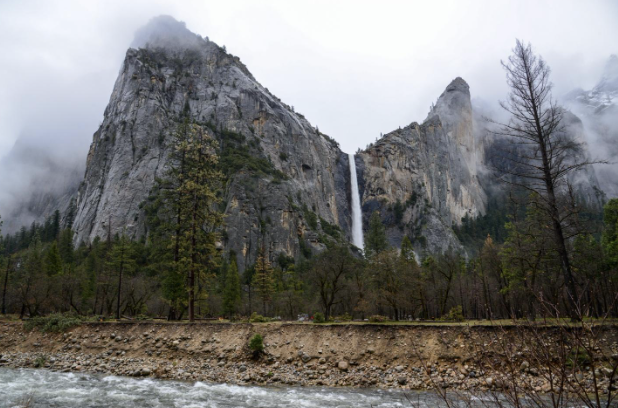|
“Bridalveil Fall—Yosemite National Park” by Jorge Láscar (2017). Licensed under CC BY 2.0. In his famous documentary, Ken Burns called national parks “America’s best idea.” When individuals think of the United States, they often conjure images of wilderness in the American West documented by Burns, such as Yosemite and the Grand Canyon. These spaces, which have been preserved through the National Park System, are associated with environmentalists like Teddy Roosevelt and John Muir, the latter of whom founded the Oakland-based environmental justice organization Sierra Club. To think of Yellowstone, for example, is to think of America itself.
But behind this grand narrative of conservation is a complicated racial history, one dotted with segregation, prejudice, and white privilege. During the Jim Crow era, national parks adhered to the “separate but equal” laws throughout the country, meaning outdoor spaces in the South and within border states such as Kentucky and Missouri were treated like segregated businesses. The park rangers who oversaw these spaces upheld segregation in campgrounds, restrooms, parking lots, cabins, and other public facilities. While some National Park Service employees desired to treat visitors equally, these officials were usually challenged throughout Jim Crow states by park superintendents, Southern congressmen, and various organizations. Even when governmental officials were sympathetic to the concerns of Black citizens, the actions and policies carried out often didn’t reflect a pro-Black sentiment for fear of upsetting white people with power. For instance, Harold Ickes, a known supporter of the National Association for the Advancement of Colored People (NAACP) who held the position of Secretary of the Interior between 1933–1946, opposed marking facilities as “segregated” on maps, even if there was segregation in practice, so as to not perpetuate the idea of separation throughout the national parks. This idea may have seemed good in theory, but Ickes’ decision effectively made it more difficult for potential Black visitors to discern which spaces were safe for them. In the absence of word-of-mouth insights from fellow Black travelers, Black families would have to risk using a public resource, such as a picnic table or a bathroom, to ultimately determine if they were allowed to use it. Another questionable policy was upheld by the third director of the National Park Service, Arno Cammerer. He only wanted to build public facilities for Black visitors if there was sufficient demand for them. However, this policy didn’t apply to white individuals, and because of the perceived low interest in outdoor recreation from Black folks, facilities often weren’t built for Black use. And of the facilities that were created specifically for Black visitors, they were generally deprioritized, underfunded, and/or simply subpar compared to those built for white people. These historical accounts of Ickes and Cammerer represent only a fraction of the racist practices and attitudes that prevailed throughout the National Park System during the Jim Crow era. A couple of other distressing truths: Virginia’s Colonial National Historical Park was completely developed using segregated Black labor, and Franklin D. Roosevelt’s Civilian Conservation Corps, which was responsible for the development of various trails and park facilities, would segregate their workers across Southern parks. Even big names like Muir and Teddy Roosevelt are fraught with racism, as the former made derogatory remarks about Black and Indigenous folks and the latter viewed Filipinos, Cubans, and Puerto Ricans as inferior to Americans. Ostensibly bastions of freedom, egalitarianism, and democracy, as Burns’ documentary might present them, national parks have been anything but. Two years ago, the Sierra Club’s executive director even called out the organization’s founder, the “father of national parks,” for his racism. On top of all this, Indigenous peoples have been forced off their homelands in the name of national park preservation. One of the earliest national parks, Yosemite bears a history of bloodshed as the Miwok people were exterminated and, if any settlements remained afterward, were evicted from their land. And even if Indigenous peoples weren’t murdered or relocated, they were denied access to national park resources, which they’d used for many years before the areas were deemed “national parks.” Unfortunately, the problematic history of the National Park System follows us to today. Inclusive Guide Co-founder Parker McMullen Bushman was recently denied entry at a California park by a worker there who thought she was going to do something “nefarious.” Although this particular area was open to the public 24 hours a day, Parker was racially profiled by the park official and subsequently treated unfairly. In Colorado, too, Black women have been harassed by park employees. Indeed, a group of Black women was recently stopped by a ranger at Rocky Mountain National Park because they were thought to be smoking weed, but they didn’t have any cannabis on them. These are only a couple of the many stories that exist for people of color at national parks across the US. Like any business, national parks aren’t neutral spaces. They contain human beings with the potential to discriminate, treat people unfairly, and maintain the status quo. National parks are only as welcoming as the people who oversee them. As such, park rangers and other staff should be aware of the biases they may bring to their management of parks and other wilderness areas. Segregation is no longer the law of the land, but like Parker’s experiences reveal, outdoor spaces aren’t free from microaggressions, prejudice, and unwelcoming attitudes in general. If we want everybody to use and benefit from national parks, we must manage them intentionally with an eye toward equity, inclusion, and social justice. Follow us on Twitter @InclusiveGuide, Instagram @inclusiveguide, and Facebook @kweenwerk and @InclusiveJourneys to stay up to date with Parker’s Liberation Tour across the South and Midwest. You’ll also want to follow along to catch more educational posts and insights like this about the history of outdoor spaces. Sources Colchester, Marcus. “Conservation Policy and Indigenous Peoples.” Cultural Survival Quarterly Magazine, March 2004, culturalsurvival.org/publications/cultural-survival-quarterly/conservation-policy-and-indigenous-peoples#:~:text=National%20parks%2C%20pioneered%20in%20the,central%20to%20conservation%20policy%20worldwide. Accessed 15 June 2022. Conde, Arturo. “Teddy Roosevelt’s ‘racist’ and ‘progressive’ legacy, historian says, is part of monument debate.” NBC News, 20 July 2020, nbcnews.com/news/latino/teddy-roosevelt-s-racist-progressive-legacy-historian-says-part-monument-n1234163. Accessed 15 June 2022. Melley, Brian. “Sierra Club calls out founder John Muir for racist views.” PBS Newshour, 22 July 2020, pbs.org/newshour/nation/sierra-club-calls-out-founder-john-muir-for-racist-views. Accessed 15 June 2022. “The National Parks: America’s Best Idea.” PBS, pbs.org/kenburns/the-national-parks/. Accessed 15 June 2022. Repanshek, Kurt. “How the National Park Service Grappled with Segregation During the 20th Century.” National Parks Traveler, 18 Aug. 2019, nationalparkstraveler.org/2019/08/how-national-park-service-grappled-segregation-during-20th-century. Accessed 15 June 2022. |
KWEEN WERK NARRATIVESKWEEN stands for Keep Widening Environmental Engagement Narratives. Archives
January 2024
Categories
All
|



 RSS Feed
RSS Feed
